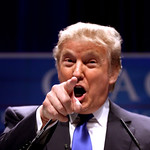Yet, one would assume that if the supposedly all-powerful Putin wanted to give a $1 billion or so payoff to his golden boy, Donald Trump, whom Putin just knew would become President in five years, the deal would have happened.
Whetting the Appetite
Despite the dubious quality of Steele's second- and third-hand information, the June report appears to have won the breathless attention of Team Clinton. And once the bait was taken, Steele continued to produce his conspiracy-laden reports, totaling at least 17 through Dec. 13, 2016.
The reports not only captivated the Clinton political operatives but influenced the assessments of Obama's appointees in the U.S. intelligence community. In the last weeks of the Obama administration, I was told that the outgoing intelligence chiefs had found no evidence to verify Steele's claims but nevertheless believed them to be true.
Still, a careful analysis of Steele's reports would have discovered not only apparent factual inaccuracies, such as putting Trump lawyer Michael Cohen at a meeting with a Russian official in Prague (when Cohen says he's never been to Prague), but also the sort of broad conspiracy-mongering that the mainstream U.S. news media usually loves to ridicule.
For instance, Steele's reports pin a range of U.S. political attitudes on Russian manipulation rather than the notion that Americans can reach reasonable conclusions on their own. In one report dated Sept. 14, 2016, Steele claimed that an unnamed senior official in President Vladimir Putin's Presidential Administration (or PA) explained how Putin used the alleged Russian influence operation to generate opposition to Obama's Pacific trade deals.
Steele wrote that Putin's intention was "pushing candidate CLINTON away from President OBAMA's policies. The best example of this was that both candidates [Clinton and Trump] now openly opposed the draft trade agreements, TPP and TTIP, which were assessed by Moscow as detrimental to Russian interests."
In other words, the Russians supposedly intervened in the U.S. presidential campaign to turn the leading candidates against Obama's trade deals. But how credible is that? Are we to believe that American politicians -- running the gamut from Senators Bernie Sanders and Elizabeth Warren through former Secretary of State Hillary Clinton to President Donald Trump -- have all been tricked by the Kremlin to oppose those controversial trade deals, which are also broadly unpopular with the American people who are sick and tired of trade agreements that cost them jobs?
Steele's investigative dossier suggests that we can't really think for ourselves. We are all Putin's puppets.
Greater Skepticism?
Normally, such a ludicrous claim -- along with the haziness of the sourcing -- would demand greater skepticism about the rest of Steele's feverish charges, but a curious aspect of the investigations into Russia's alleged "meddling" in Election 2016 is that neither Steele nor the "oppo research" company, Fusion GPS, that hired him -- reportedly with funding from Clinton allies -- has been summoned to testify.
Usually, official investigations begin with testimony from the people who are making the allegations, so their credibility and motives can be tested in an adversarial setting. Plus, some baseline information should be established: Who, for instance, paid for the contract? How much was the total and how much went to Steele? How much did Steele then pay his Russian contacts and did they, in turn, pay the alleged Russian insiders for information? Or are we supposed to believe that these "insiders" risked being identified as spies out of a commitment to the truth?
None of these answers would necessarily discredit the information, but they could provide important context as to whether this "oppo" team had a financial motive to sex-up the reports to keep Clinton's friends coming back for more. Arguably the funders of this "oppo" research should be called to testify as well regarding whether they would have kept ponying up more money if Steele's reports had concluded that there were no meaningful contacts between Trump's people and the Russians. Were they seeking the truth or just dirt to help Hillary Clinton win?
Since last November's election, Steele has ducked public inquiries and Glenn Simpson, the former Wall Street Journal journalist who heads Fusion GPS, has refused to divulge who hired his firm or answer other relevant questions. That means we still don't know which Clinton friends paid for the dirt and how much money was given to subcontractors like Steele and his Russian associates. (One source told me it may have totaled around $1 million.)
According to various press reports, Fusion GPS first worked for a Republican opponent of Trump's, but then switched over to the Clinton side after Trump won the Republican race. With Steele generating his reports every few days or every few weeks, people close to Clinton's campaign saw the Russia allegations as a potential game-changer. They reached out to reporters to persuade them to publish Steele's allegations even if they could not be verified.
(Note: You can view every article as one long page if you sign up as an Advocate Member, or higher).






